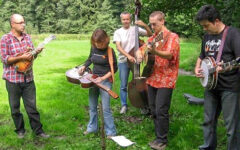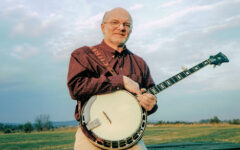
Iain Matthews may have been born in Britain, but for much of his career, he’s pursued a solidly American folk/grassicana template. Although he first came to fame via a stint in the band that pioneered the folk rock form in the U.K., that being the remarkably underrated Fairport Convention, he left that band early on and subsequently formed Matthews Southern Comfort, a group best known in the U.S. for their own hit version of Joni Mitchell/CSNY’s Woodstock, and then, after that, the on again/off again outfit Plainsong, all while pursuing a prolific solo career after and in-between.
Earlier this year, Matthews returned to his roots by reforming Matthews Southern Comfort and releasing Like a Radio, the band’s first new effort in some 40+ years. The music is as supple as ever, and along with its smooth, seductive delivery, he delves into a stirring grassicana delivery that comes to the fore on such songs as Bits and Pieces, Jive Pajamas, Crystals on the Glass, and To Love. In addition, a gentle take on the classic tune Darcy Farrow finds him tapping tradition in ways that recall his seminal work with the Fairports.
We recently had the opportunity to connect with Matthews and ask him about his ongoing fascination with American music, if the origins really define it as American music to begin with, and the route he took in his return to Matthews Southern Comfort.
BLUEGRASS TODAY: For starters, what initially inspired your interest in acoustic American music?
Iain Matthews: I began listening to songwriters a few months before I joined Fairport. I became aware of a clique of American songwriters via the Byrds. Dylan led to Leonard Cohen, which led to Tim Harden, Tim Buckley, and on and on. From there, it just kind of exploded on me, and of course, joining Fairport accelerated that.
You lived in Austin,TX for awhile. Did that residency bring you closer to that Americana/grassicana sound, and if so, how so?
By the time I arrived in Austin, acoustic music was already my go-to choice. That’s not to discount other genres. I would basically listen to anything I considered good.
What inspired you to reconvene Matthews Southern Comfort after all these decades?
It’s a long story. I was never happy with the sound of the band. Pedal steel guitar quickly became a bone of contention for me. It’s well documented. Plus, I wanted to see where the band might have gone if I’d made changes rather than leaving. So in 2005, I formed a new version of the band and experimented. The new record is the outcome of that experimentation. The new version of the band leans more towards the original sound but without the steel guitar.
What is the status of Plainsong? You revived it over the years and kept the brand going until recently. Did you insert your early echoes of Americana/grassicana music in their efforts?
Plainsong is over. That’s not to say that Andy (Roberts, his chief foil in the band) and I won’t work together again. But the concept of Plainsong is done. The music of Plainsong was based solely on an acoustic sound. Of course there are echoes. Plainsong was an extension of me and my tastes.
How do you feel British traditional music connects, and even overlaps, with traditional American music of the folk and bluegrass variety, especially as regards the latter?
How do I feel?! I accept it. If you were to follow the paper trail, American and bluegrass music began in Europe. Probably in Ireland, Now, it’s simply swapped back and forth. All genres overlap.
To expound on that notion then, how do you account for Americana and bluegrass in particular being so popular far from America’s shores?
As I said, this is where it began, not in the USA. If you trace it back, it’s indigenous to Europe, same as the blues. The blues came from Africa. I’m not sure there really is a genre of music that actually began in the USA. Maybe jazz, but even that is debatable.
Who are you listening to these days that you’re especially keen on?
I mostly listen to jazz, but as far as bluegrass, it would be Ed Snodderly. I like his work, I’ve been playing quite a lot of Greg Brown and Chip Taylor lately as well. There’s a new album called Fear Not by Cameron Blake that I like a lot too.







